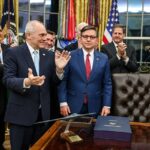National security practitioners held several high-profile pandemic wargames and exercises in the years prior to the outbreak of COVID-19. Often, these games eerily predicted events in the current pandemic, along with the policy hurdles the government has faced. Instead of serving as a clarion call for preparedness or guiding the response, however, these games have become an ironic historical footnote.
What lessons should the wargaming and policy communities take from this experience? Games have a proven record of helping people think through “wicked problems” such as counterinsurgencies, major wars, great–power competition, or pandemics. But this beneficial effect only occurs if policymakers and organizations can access, absorb, and act on the insights and lessons they provide.
I’ve been on multiple sides of this problem, as a wargamer, player, analyst, advisor, and strategist. This hybrid experience has given me multiple lenses to examine wargaming’s role in policymaking. It also forced me to grapple with the tensions between achieving research objectives, respecting wargaming’s strengths and limitations, and informing policy.
I want to emphasize that this is not a critique of the pandemic games or their designers. I use them as an example of how even well-designed games on crucial topics may not have the desired policy impact if their insights fail to reach key policymakers or influence their thinking.
The purpose is to start a conversation on how the wargaming community can ensure that our oft-prescient work has the policy impact we desire. Informing policy requires embracing what makes wargaming unique: people and the stories we tell.
CREATE HUMAN NETWORKS AROUND GAMES
Like war (or crisis response), wargaming is a human endeavor. As I discuss below, this can be frustrating, but it can amplify wargaming’s impact. Insights don’t inform policy by simply existing — humans make the connection. Wargaming can create networks to promulgate and implement insights. Too often, however, games are echo chambers lacking sufficient diversity or adequate connections to the levers of policy. Inviting the right kinds of players and keeping them engaged throughout the wargaming process — including after the game — is critical to creating an engagement network, rather than an echo chamber.
To the national security community: please make time to participate wargames, particularly on topics where you can have a meaningful impact. It can be tough to carve out the time, but you need to make it happen, because you make the games happen. This message goes double for senior leaders. Your attendance raise everyone’s game, sends a signal about the importance of wargames to your subordinates and, perhaps most importantly, helps generate policy visibility for a game. Senior leaders can increase the diversity of experience at games directly by participating, and indirectly by ensuring that a broad cross-section of their subordinates participate, instead of the usual suspects.
Too often, games are echo chambers lacking sufficient diversity or adequate connections to the levers of policy.
Wargamers need to increase participation by making games more accessible. We need to shorten them, even if that requires greater abstraction in game design. Exceptional players are exceptional personnel, which means their time is in demand. A full day of gaming is difficult, and three days is virtually impossible. We need to maximize engagement during play and create flexibility to get work done during breaks. We need to increase our ability to run remote games, and not just because of the COVID-19 pandemic. It reduces travel costs, thereby increasing participation.
We need to increase the diversity of players and make sure all players are heard. Wargaming has a reputation as being dominated by the male (hence the origin of the phrase BOGSAT), and the pale. For example, women have been central in building RAND’s wargaming practice and fostering a new generation of women gamers, but this remains an exception. Wargaming should be a welcoming community that prioritizes the thought over the thinker, but games often fail to attract women or people of color. My experience further suggests that some of these players struggle to be heard amidst defense leaders more accustomed to executing plans than encouraging deliberation among diverse viewpoints.
We also need to increase the diversity of backgrounds and perspectives at our games. Most wargames exist within the defense ecosystem, but warfare tends to escape organizational shackles. Rather than defense personnel discussing “whole-of-government approaches,” why not bring in players that can actually represent the whole of government? Instead of debating how allies might behave, why not include participants from those nations or, if classification is an obstacle, relevant members of the intelligence community, State Department, or academia?
Incorporating outside communities is difficult, not least because it requires convincing their leadership of the merit of your wargame. High-level, official games can pull in this expertise, but working-level games run by federally funded research and development corporations (FFRDCs) and think tanks can find it difficult. Still, the payoff in terms of insights and policy relevance merits the effort.
Including new perspectives will make games more relevant in two ways. First, it improves quality and, with all other conditions remaining the same, good games tend to get more traction than mediocre ones. Second, it broadens the network effect of the game. If the players are taken from two separate groups — the converted and the choir — a game is unlikely to spread the gospel.
The immediate post-game period is the most critical moment for informing policy. This is counterintuitive, because it’s also the time when wargamers tend to feel like the work is done. After months spent designing, planning, and executing a game, the post-game period feels like a moment to relax and cogitate on the outcome. This is understandable, but wrong.
Quick-turn findings, hotwashes, and other interactions with sponsors, players, and other audiences are the “Phase IV” of wargaming when we consolidate the cognitive gains made during the game. Good wargames create a pulse of intellectual energy that decays quickly. We have to capitalize on it while we can to get the story of the game to the right audiences.
LISTEN TO THE PLAYERS, EVEN WHEN THEY’RE BEING ANNOYING
Game designs and scenarios are boxes constructed of assumptions and constraints to focus players on the research objective. Unfortunately, players are independent variables incarnate. Try to contain them at the operational level of war and they will quickly escape and spend hours discussing grand strategy before diving down into the tactical weeds.
This behavior is annoying, but instructive. People are unpredictable, but they are at least predictably unpredictable. If a scenario causes cognitive dissonance in players, chances are it will do the same thing to commanders and policymakers in real life. If players chafe against staying at the “appropriate” level, this might indicate that A) you’ve invited the wrong players, or B) critical issues might lie outside the “box” of your scenario, and real-world policymakers might also struggle against such constraints.
To the credit of the Naval War College team that ran “Urban Outbreak 2019,” they recognized this in their findings:
“…players would often exhibit physical discomfort and become argumentative concerning those aspects of the scenario that did not conform to their previous experience… even when other experts in the room would vouch for the scenario’s veracity and relevance… these reactions generally led resistant players to ignore or overlook good resources and guidance in their problem solving. If left unchecked it can often lead to a groupthink sentiment of ‘different is dangerous,’ with an obvious impact on effectiveness.”
TELL A GREAT STORY
As my colleague Dr. Ed McGrady would say, wargaming is a form of collective storytelling. Some critique wargames on this count, since they aren’t as controlled, clean, and repeatable as other forms of analysis. According to him, wargames are:
“unrepeatable, chaotic, vague, and messy events. Collecting data from them is difficult — they produce ‘dirty’ data, you often miss the best parts, and they cannot be repeated. But if you think that means you can’t learn anything from them, you might as well stop trying to understand real-world conflicts, because everything I have written about wargames in this paragraph is also true for wars.”
The irony here is thick. Few would dispute using history to inform our thinking, even though it’s just a single narrative. Fewer still would dispute the role of chance and human folly in history. And yet many who would never dare question Clausewitz or Thucydides readily dismiss wargames as a single story defined by dice rolls and flawed human decisions.
Wargamers are therefore reluctant to lean into the narrative strength of our methodology. Instead of sharing a compelling story, we tend to fall back on anodyne “insights” that fail to spark interest in the audience. Wargamers avoid the emotions of the players and the element of chance because we’re self-conscious about what wargames do not produce (i.e., “true” analysis) rather than enthusiastic about what they create: narrative histories of events that might be.
By hiding their narrative function, we’re robbing wargames of what makes them uniquely powerful for informing policymakers. Cognitively, humans are “hard–wired for storytelling,” for communicating and making sense of the world around us. This is why, for example, “The Cobra Event” stimulated President Clinton’s interest in bioterrorism, and prompted the creation of the US Strategic National Stockpile. Likewise, President Reagan became interested in computer hacking after watching the movie “Wargames.” Some historians and quantitative analysts may recoil at the influence of narrative on our thinking, but if the object is to inform policy, it’s better to work with human nature, rather than fight it. Like war, policy is a human endeavor.
Wargamers should lean into the narrative aspect of games to tell a compelling story rather than issue bland insights via PowerPoint. Instead of “Logistics were an issue for the Blue (US) Team,” try, “Blue commander frustrated that logistics hobbled offensive.” The first is a throwaway; the second — fleshed out with an anecdote or a historical analogy — is a story that the audience can feel. Convey a clear story using convincing examples, while avoiding exaggeration or histrionics, and wargames can convince audiences while maintaining credibility. Academics and analytic purists might be horrified, but such is the sausage-making of policy.
A word of caution is in order. The philosopher Stan Lee once said, “With great power comes great responsibility.” The narrative power of wargaming can be used to enlighten or to inveigle. We must be careful about overselling our insights. Sometimes, however, a game comes along with insights so critical — e.g., the US government is unprepared for a pandemic — that wargamers should push the envelope because the risk of inaction is so acute. There is no heuristic to guide us other than: don’t peddle bullshit.
SEPARATE REAL GAMES FROM THE REST
Wargaming, as part of a cycle of research, is key to informing policy decisions. I believe this so strongly that I worked to put wargaming at the center of the analysis that supported the 2018 National Defense Strategy.
Wargames can be a chance to experience rare situations such as wars or pandemics. They offer a sandbox in which to challenge assumptions and examine new approaches. They can help accustom players to making consequential decisions with imperfect information. However, many people never experience this kind of game. At virtually every wargame I’ve been involved in, a senior player says, “I’ve never done this before.” It’s unsettling that senior defense personnel can make it through careers without attending a “real” wargame in which they had to make decisions and deal with the consequences.
Wars, pandemics, and other crises are complex, fast-moving situations that demand decisive action with grave consequences under paralyzingly deep uncertainty. They never take the shape of guided discussions about what we think about a problem, absent any urgency, competition, consequences, or fear. Yet too often, the policy community claims to have “wargamed” an issue, when we’ve held workshops, seminars, and other forms of the dreaded BOGSAT. These events have their purposes, but they aren’t wargames. Unsurprisingly, it appears that some of the pandemic “exercises” in question fit this pattern.
The lack of exposure to “real” wargames hampers the ability of leaders and their staffs to handle crises effectively. It’s like expecting a football team to win a game after discussing the playbook, but not scrimmaging. It also raises questions about policymakers’ willingness and ability to derive lessons from wargaming.
The reinvigoration of wargaming prompted by former Deputy Secretary Bob Work and former Vice Chairman Gen. Paul Selva has raised its profile, but there is room to improve the policy impact of wargaming. Wargamers should start by building human networks and telling our stories. If we do this, and get good dice rolls, maybe we’ll cease learning about wargames as ironic historical footnotes, and instead read about how the US government leveraged insights from wargaming to avert catastrophe, save lives, and lead America toward a better place in the world.
Christopher Dougherty is a Senior Fellow with the Defense Program at the Center for a New American Security (CNAS). Prior to joining CNAS, he worked in the Office of the Undersecretary of Defense for Policy, in the office of Strategy and Force Development. During his time in the Pentagon, he helped lead the analytical support to the 2018 National Defense Strategy (NDS) and was part of the core team that developed and wrote the NDS.














